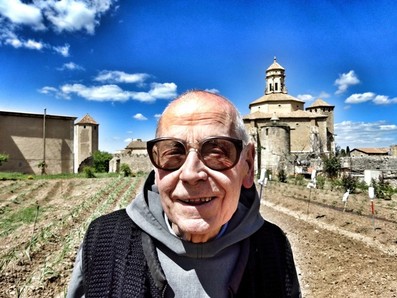 Richard is a Cistercian monk from the monastery of Poblet, in Spain full of happiness and peace. He is 88 years old and he has lived in this monastery for 70 years. The only books he has read are the "The Old Man and the Sea" by Ernest Hemingway and the Bible. In the photo, he is on a break from his main task, growing tomatoes. Behind him there is the orchard, and further away, the monastery. Location: Poblet Monastery, Catalonia, Spain This picture entered the National Geographic 2014 photo contest here by Octavi Miro. For more stories from Octavi's travels through Africa, follow his blog.
0 Comments
When traveling abroad, there is only so much you can do to really know what is taboo or viewed as inconsiderate in a foreign land. You might even live in a country for a few years, and still find things you never knew until someone told you. That is bound to happen since our behavior and protocol is learned over many years, becoming part of who we are and how we value things. Of course, common sense and being generally open and considerate will prevent you from being considered “rude and uncultured” as a foreigner in any land.
In any case, knowledge does go a long way. When we recently went to Tokyo, we noticed that the trains and subways were very quiet, there are signs everywhere with a phone and an X on top of them. No talking aloud on the train. However, when we were in Osaka, the trains were bustling with conversations with noise of beer cans being opened. A stranger even spoke to us in English, while his colleagues laughed and cheered him on. We are still not sure if the "no talking on the train" mandate is regional or just a suggestion. To discover more of these unexpected missteps, BBC recently sought out the advice of users on question and answer site Quora, asking “What should I absolutely not do when visiting your country?” See the etiquette rules that surprised them the most here. Do you know of any etiquette that foreigners should know when visiting your country? -Yumi Zaic It’s Friday, World Music Friday!
Today we want to dance with Argentina, a multicultural country, as varied as the country's geography. Nothing represents this complex intertwining of cultures (African, Indigenous and European) better than Tango, one of the most sensual and passionate dances in the world. It originated on the outskirts of Buenos Aires in the poorer areas. Tango refers to more than just the dance and encompasses the sensuality of the music, rhythms and lyrics. Tango, like football, is seen as strongly representative of the country's national identity, and most Argentinians take pride in their country's multicultural and multi-ethnic identity. Astor Piazzola, an Argentine tango composer, bandoneon player and arranger. His oeuvre revolutionized the traditional tango into a new style termed nuevo tango, incorporating elements from jazz and classical music. A virtuoso bandoneonist, he regularly performed his own compositions with a variety of ensembles. Here a composition of his, Libertango. The title merges the words "Libertad" (Spanish for liberty) and "Tango", symbolizing Piazzolla's break from Classical Tango to Tango Nuevo.[1] Enjoy the music! Have a great weekend! - Alba Serrano-Miro |
AuthorUnicultural team and trainers, sharing our views and experiences on everything cultural. Archives
May 2016
Categories
|

 RSS Feed
RSS Feed